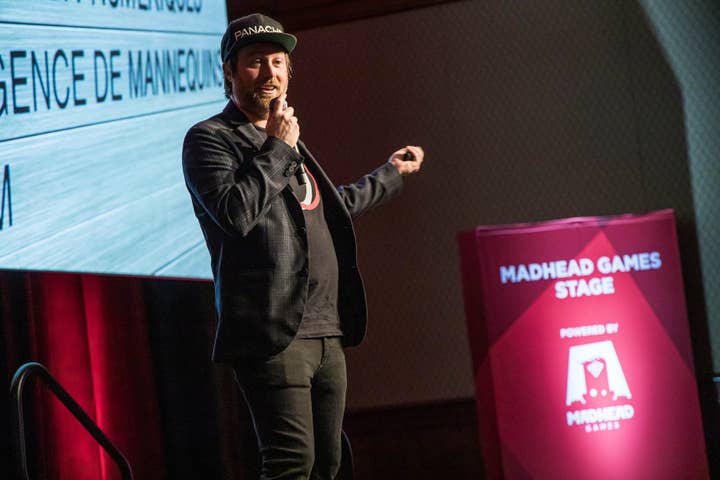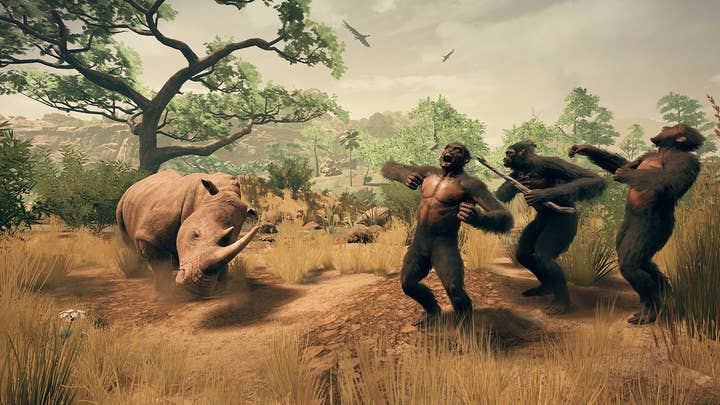Patrice Désilets: Ancestors fell foul of critics' expectations
"People expected my studio of 35 people to ship a game that is close to Assassin's Creed -- and it's just not possible"
Panache Digital co-founder Patrice Désilets had admitted his disappointment with the critical reception that greeted his studio's debut game, Ancestors: A Humankind Odyssey. Speaking at Reboot Develop Red, the former creative director of Assassin's Creed questioned the sincerity of some reviewers, and their assumptions about what kind of game Panache's 35-strong team would produce.
Ancestors launched on the Epic Games Store at the end of August. After more than 70 reviews, Désilets said, it had a Metacritic average of 65 -- a figure that he referred to as "the elephant in the room" at the start of a talk that would chronicle the game's creation and development.
"I'm used to having bigger numbers than that, so it's the elephant in the room," he said, referring to the first three Assassin's Creed games, all of which had Metacritic averages between 80 and 90. "But people expected my studio of 35 people to ship a game that is really close to Assassin's Creed, and it's just not possible. We made some harsh decisions in order to ship the game, and we wanted it to be different."
"We know for a fact that some reviewers actually didn't play the game... My people are pissed, by the way"
The pragmatic reality of shipping a game and the desire to make a unique experience would be the talk's two major themes. First, however, Désilets had an accusation to level regarding the professionalism of certain websites.
"We know for a fact that some reviewers actually didn't play the game," he continued. "It is part of our industry -- they have to review games, and they have 15 of them to review in one week, and sometimes they don't have time. And since Ancestors is so different, some of them went 'urgh, I don't have time for this.'
"And we know for a fact that some just invented some elements in the game -- like there is no fire and you cannot ride any horses, even though one reviewer said 'oh, it wasn't that great when you ride a horse.' Yes. My people are pissed, by the way.
"So please don't take notes today as we talk, mainly because I don't know how to make a video game."
While Désilets had tongue firmly planted in cheek when making that comment, there was a kernel of truth at its core. No matter how much experience a designer has from previous work, he explained, each new game is fundamentally different. While he left Ubisoft as an expert in making Assassin's Creed, he was a novice at making a game from the themes at the heart of Ancestors.

"Because of the subject matter you're trying to attack," he said. "Personally, I never made a game about human evolution before, so it was 'How do I make a game about that?'"
This was new territory not just for Panache but for video games as a whole. The solutions that Panache found for articulating those concepts were unusual, and Désilets believes that some didn't understand it before they gave up trying -- "it needs an hour," he said, before adding, "maybe two."
But some decisions were informed by the more mundane reality of running a studio -- the need to get the best possible result from limited resources, and making sure that the company would survive to make another game. Realities, it is worth noting, that Désilets didn't have to consider when he shipped three Assassin's Creed games.
"We shipped the game and we left 72 pop-up tutorial messages on the floor... We didn't have time"
"President, CEO, responsible for 35 families," Désilets said. "The game designer in me wants to make a decision about the quality and whatnot, and then the other guy says, 'no, no, I'm responsible for those people, and I need to make a decision that makes sure the studio doesn't shut down, and that it's good for at least two other years afterwards'... Without them, I'm not here."
Panache Digital was scaling up for much of the four years that Ancestors was in development, but the team was never more than a few dozen at its peak. According to Désilets, he had one full-time level designer, two animators, one UI specialist, four people in the art team, and eight programmers -- an embarrassment of resources for many games, but not for a game of the scale and ambition of Ancestors.
This led to the choice of a hyper-real art style that avoided the extra work that a more photo-realistic approach would have required. It was also another incentive to use a more open, systemic structure, with very little in the way of hand-holding.
"That was the question I went with: 'Hey, homo sapiens, you think you're top of the evolutionary chain? Can you survive like our Ancestors did?' And this is why a bunch of what would be normal game design decisions of helping the player, we went 'we're not doing it?' Because otherwise we're answering the question for the player, and it doesn't make sense.

"And this is why you need teams of 200, and 800, and 2000, because you need to come up with all the missions and whatnot. I felt it was so much [more] powerful to [let the player] come up with their own storytelling instead of ours. Homo sapiens, deal with it."
Ancestors wasn't intended to be quite so uncompromising, though. Désilets wanted to include advice to introduce players to the game's systems, but mundane reality interfered again. Panache simply had to ship the game, and some features had to be cut to make it happen.
"I built a toolbox, I've got a studio, I've got a team... and I've still got 1666: Amsterdam"
"We shipped the game and we left 72 pop-up tutorial messages on the floor," he said. "We couldn't do it. They are coming now for the console version -- they will be in, it will be easier -- but we didn't have time. You need to eventually say, at the end of the day, that you have to ship. And that's more important than anything else."
Despite the mixed reception it received, though, Désilets said that it had broken even from a commercial standpoint. When asked about sales by a member of the Reboot Develop audience, he responded: "Yeah, yeah, yeah, the money is made. Plus, I know it's more a console game than a PC game."
This was a reference to Ancestors' launch for Xbox One and PlayStation 4 on December 6, which should be an opportunity for the game to achieve even greater financial returns for Panache and its publisher, Private Division. After that, Désilets said, will be another project that he has been attempting to make since leaving Ubisoft almost a decade ago.
"I built a toolbox, I've got a studio, I've got a team... and I've still got 1666: Amsterdam," he said.
1666: Amsterdam was in development at THQ Montreal, the ill-fated studio that Désilets left Ubisoft to run. When THQ collapsed and Ubisoft stepped in to acquire what was left, that included the IP. A legal battle ensued, which was finally resolved in April 2016, when Désilets finally regained control of his idea. Eurogamer, which was in the audience, asked how serious he was about revisiting 1666.
"How serious? I almost lost my house over it," Désilets said. "I'm not joking... I fought for it. I said 'No, you won't have my game,' and I got it back.
"What's great is that it's not the game after Assassin's Creed: Brotherhood any more. It's the game after Ancestors. It's the game not made with THQ Montreal. It's the game made by Panache."
GamesIndustry.biz is a media partner of Reboot Develop Red. We attended the show with assistance from the organiser.
